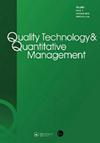基于kriging的重要区域采样方法的高效可靠性分析
IF 3
2区 工程技术
Q3 ENGINEERING, INDUSTRIAL
Quality Technology and Quantitative Management
Pub Date : 2022-09-06
DOI:10.1080/16843703.2022.2116265
引用次数: 4
摘要
可靠性分析方法,如主动学习Kriging代理模型与基于仿真的方法相结合,近年来备受关注。这些技术可以在一定程度上降低计算成本。然而,对于复杂的工程问题,计算负担可能仍然很重。为了解决这些问题,提出了一种基于克里格的重要区域抽样方法来进行有效的可靠性分析。新方法是对原有的Kriging和蒙特卡罗模拟相结合的主动学习可靠性方法(AK-MCS)的改进,并开发了三种策略来增强原有方法:1)利用一种新的策略,称为关键点法,来定义实验的初始设计(DoE),而不是拉丁超立方体采样;2) 提出了动态重要区域/不确定区域和重要因子的概念,以避免在DoE中添加无用的样本点,这对Kriging模型的精度提高影响不大;3) 引入冗余区域,使新样本点与已有样本点之间的距离大于一定值,避免了样本点过近造成的信息冗余。通过五个实例验证了这种新方法的有效性和准确性。本文章由计算机程序翻译,如有差异,请以英文原文为准。
A Kriging-based important region sampling method for efficient reliability analysis
ABSTRACT Reliability analysis methods such as active learning Kriging surrogate model combined with simulation-based methods have been paid much attention in recent years. These techniques can reduce the computational cost to a certain extent. However, the computational burden may still be heavy for complex engineering problems. To address these issues, a Kriging-based important region sampling method is proposed for efficient reliability analysis. The new method is an improvement on the original active learning reliability method combining Kriging and Monte Carlo simulation (AK-MCS), and three strategies are developed to enhance the original method: 1) a new strategy, which is called the key point method, is utilized to define the initial design of experiment (DoE) instead of the Latin hypercube sampling; 2) the concept of dynamic important region/uncertain region and importance factor is proposed to avoid adding useless sample points to the DoE, which have little effect on the accuracy improvement of the Kriging model; 3) the redundant region is introduced to make the distance between the new and existed sample points be larger than a certain value and avoid the information redundancy caused by too close sample points. Five examples are utilized to demonstrate the efficiency and accuracy of this new method.
求助全文
通过发布文献求助,成功后即可免费获取论文全文。
去求助
来源期刊

Quality Technology and Quantitative Management
ENGINEERING, INDUSTRIAL-OPERATIONS RESEARCH & MANAGEMENT SCIENCE
CiteScore
5.10
自引率
21.40%
发文量
47
审稿时长
>12 weeks
期刊介绍:
Quality Technology and Quantitative Management is an international refereed journal publishing original work in quality, reliability, queuing service systems, applied statistics (including methodology, data analysis, simulation), and their applications in business and industrial management. The journal publishes both theoretical and applied research articles using statistical methods or presenting new results, which solve or have the potential to solve real-world management problems.
 求助内容:
求助内容: 应助结果提醒方式:
应助结果提醒方式:


